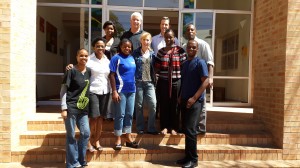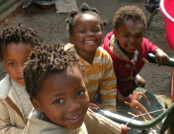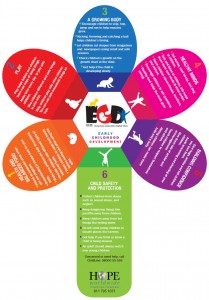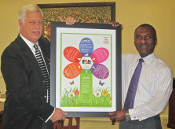Early Childhood Development
 The greatest humanitarian need that we face on earth may be the future of our children especially in developing countries like those in Africa. It is critical that we intervene now and do so as forcefully as we can. In 2013 HOPE worldwide (HOPEww) has launched its exciting, new Early Childhood Development Program across its sites in Africa.
The greatest humanitarian need that we face on earth may be the future of our children especially in developing countries like those in Africa. It is critical that we intervene now and do so as forcefully as we can. In 2013 HOPE worldwide (HOPEww) has launched its exciting, new Early Childhood Development Program across its sites in Africa.
The forgotten children of Africa
Millions of African children under 5 years are failing to meet their full developmental potential because of preventable risks including poverty, malnutrition, and inadequate levels of intellectual stimulation. These problems contribute to a cycle of low educational attainment and poor health and poverty in later life. The Lancet declared that early childhood development (ECD) was “global challenge of the greatest urgency”.
The Early Years – the most critical years
During the past decade researchers have recognized the importance of the first six years of life, especially the first 1000 days. The early years of a child are marked by rapid transformations in physical, cognitive, language, social and emotional development. It is a time of tremendous brain growth that lays a foundation for later learning.
ECD programs – the promise of a better future
New research reveals that increasing investment in early childhood development programs is a highly cost-effective strategy
that provides considerable returns, with the potential to promote long-term growth and significantly reduce inequalities in the developing world. When these children become adults, their earning potential is higher and they are less likely to engage in crime.
Investing in ECD particularly in poor communities can help to level the playing field for disadvantaged children, thereby reducing social inequalities that have often been passed on through generations. Intervening in the early years of a child’s development therefore offers the most promise setting a society up for success. While steps can be taken at a later stage to remedy the lack of development opportunities, these remedial interventions are costly and represent a significant loss of human potential.
Too few children receiving ECD services
In spite of the increased recognition of the importance of learning in the early years, far too many children in Africa still do not have access to any form of early education programs or services before starting school. Starting school at a late age and also lacking the needed early learning skills, most of these children are likely to drop-out early or lag behind in progression and learning achievement. This in turn undermines the results achieved in school retention, completion and learning achievement rates. Furthermore, few services for parent education and support are available to highly stressed and depressed caregivers in Africa.
A Promising Solution: The HOPE worldwide Approach
It is clear that additional efforts and strategies are urgently required to turn the tide on this massive challenge. Recognizing the lack of formal pre-school learning and other ECD opportunities for most children in Africa, HOPEww has developed an approach that focuses on building household and community awareness and capacity to provide ECD services.
The overall goal is to ensure that all young children are enrolled in primary school at the appropriate age and arrive with the necessary skills, enthusiasm and confidence to become successful learners.
A. Goals and Objectives
In an effort to provide preschool early learning opportunities and ECD-related services within the home and community, HOPEww has developed materials and methods to raise awareness around the important of ECD, and promote positive parenting and learning through play.
The overall goal of the initiative is to increase both the child’s readiness for school as well to create a nurturing environment to help them get the best the best start in life. The initiative aims to: Provide parents and caregivers with information about ECD and parenting skills to increase their awareness and knowledge of the importance of child development, gain skills for promoting early learning opportunities, as well as promote positive health, safety and nutrition practices.
Provide teachers in ECD with additional information, skills and tools to enhance the quality of teaching/learning methods and materials, and foster linkages/partnerships between school and home
Create or strengthen community ECD forums and networks in disadvantaged communities to promote, ECD awareness, collaboration, and better outcomes for kids.
In an effort to achieve these goals HOPEww has developed several tools and interventions:
- An ECD Parenting Manual: 5-day training
- A colorful ECD Poster with Key ECD messages for caregivers
- An ECD Caregiver Workshop Manual: 1-day Workshop
- A Parent Support Group Manual
- A Play and Development Training Manual: 2- day training
- A special Play Box that contains age- appropriate books, toys and puzzles
B. Our Reach and Potential
Currently, HOPEww’s low cost, high impact community ECD program is being implemented in South Africa across 4 sites and it is reaching 55 ECD centers, over 400 caregivers and teachers, and over 2,000 vulnerable children living in disadvantaged communities and shantytowns.
HOPEww is working closely with government and other civil society partners to roll out the program. HOPEww is also scaling up its ECD program to Botswana and Cote d’Ivoire. New opportunities also exist in several other African countries. With additional financial support HOPEww’s ECD model can be replicated quickly and effectively to many sites around Africa.
Program for Orphans &
Vulnerable Children
 Introduction
Introduction
Hope Worldwide would like to introduce its Orphans and Vulnerable Children (OVC) programs in Africa to you. There are 16,000,000 Orphans and Vulnerable Children in Africa who need long term, sustainable support and assistance. Their caregivers and households desperately need programs for Women’s Empowerment and Prevention of Gender-Based Violence as well.
Background
HOPE worldwide (HOPEww) is an international faith-based charity with 24 years of HIV/AIDS experience in Africa and it has created effective, community-based models for Orphans and Vulnerable Children (OVC) which use a child-centered, family-focused, and community-based integrated approach. HOPE ww’s model for community care and support through community mobilization has been recognized by UNAIDS as a “Best Practice” Model. Dr. Marc Aguirre, the Regional OVC Advisor for HOPE worldwide, is a member of Multi-disciplinary Regional Inter-agency Task Team (RIATT) on OVC, and Dr. Mark Ottenweller, the Global AIDS Coordinator, works on the OVC Task Force with the US government in Washington. In Botswana, Kenya, Ivory Coast, and South Africa the staff of Hope Worldwide serve on the National OVC Steering Committees which develop national OVC strategies and policies in those countries.
HOPEww has assisted 152,000 OVC in Botswana, Cote d’Ivoire, Kenya, Mozambique, South Africa, Zambia, and Zimbabwe over the last 8 years with funding from Coca-Cola, Shell Oil, Massmart, KFC, MTN, AusAid, CDC, and USAID.
Strategic Objectives:
1. Strengthening the capacity of households and caregivers especially women and preventing gender-based violence
2. Strengthening the capacity of community-based organizations to provide quality services to OVC households
3. Mobilizing and strengthening the capacity of affected communities to address the needs and challenges facing OVC
Program Strategies:
1. Training and Capacity Building of caregivers and other service providers
2. Empowerment of Women and Economic Strengthening of households
3. Prevention of Gender-Based Violence
4. Government Engagement to engage government departments and structures at local and national levels
5. Employee Involvement of corporate donors and partners
6. Health and Wellbeing to engage partners in Parent Support Groups (PSG) and Kids Clubs (KC)
7. Youth Development to assist adolescent-led households and Kids Clubs with life skills
Innovation and Developments
HOPEww has shifted from a service delivery approach to a capacity building and economic strengthening model. HOPEww has implemented its effective model of OVC Care and Support which focuses strategies and related activities at three levels; Child, Family and Community, and it will utilize training and capacity building to stengthen caregivers, households, and community organizations to sustain these efforts. In line with recent research and lessons learned from USAID HOPE will prioritize a ‘family-centred’ approach and economic strengthening in order to maximize sustainable benefit and impact in the lives of the children and their households.
Early Childhood Development (ECD) will be implemented for OVC from 0-6 years old to insure they are prepared for school. It will include basic education, exercise, nutrition, character building, health, and child protection. Manuals on Parenting, Play and Exercise, and Workshops for Parents and Caregivers have been developed. Training has already begun in South Africa, Botswana, and Ivory Coast after train-the trainers workshops have been held in South Africa. In South Africa the ECD program has been implemented in 50 local crèches which have also been refurbished. The Departments of Education and the Departments of Social Development in each of these countries have been very excited about this progress and these developments in ECD.
Future plans
HOPEww would like to expand its OVC programs to Liberia and Ghana and it would like to pursue funding to expand its regional OVC and ECD programs in multiple countries (3-4) in Africa. It would like to develop regional programs to address Gender-Based Violence (GBV) as well.
Way Forward
HOPEww would like to organize a meeting or telephone discussion to review its programs in Africa and the funding and partnership opportunities that they represent.
Economic Strengthening
This is where we would insert the text and content for this particular page. We need lots of content for each page and maybe some pictures. This page is just a demo and needs to be updated.
If you are the author of this page or the designated person to update this information please text it to the webmaster by using the Contact Us form located at the main menu.
Thank you.

Capacity Building
This is where we would insert the text and content for this particular page. We need lots of content for each page and maybe some pictures. This page is just a demo and needs to be updated.
If you are the author of this page or the designated person to update this information please text it to the webmaster by using the Contact Us form located at the main menu.
Thank you.

